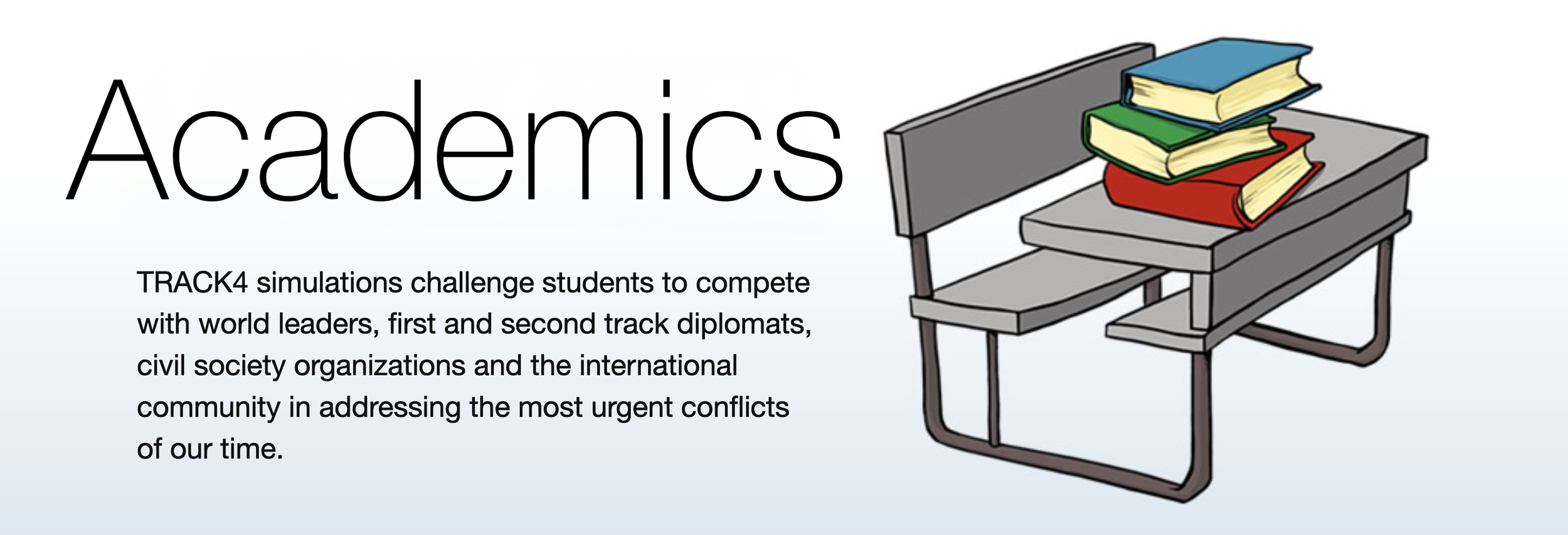TRACK4 for Students and University ProgramS
Graduate schools offer a rich variety of courses in conflict resolution theory, but teaching the practice of conflict resolution poses serious challenges. One reason is that while most international affairs programs offer students opportunities take internships abroad, they cannot be placed in the midst of an ongoing conflict; nor can they be in the position of high-level mediators.
TRACK4 allows students to encounter some of the greatest challenges of conflict and negotiation without actually being on the ground or in positions of power and influence. Through the course of the simulation students come face to face with the limits encountered by real actors, and imagine and then construct innovative mechanisms for change. Even more crucially, before prescribing ‘solutions‘ they begin to grasp – on an experiential level – why conflict persists.
In this process students cannot merely put forth critiques about what is being undertaken or neglected in conflict zones or the actions of various players and world leaders. Instead, they must offer alternatives and grapple with the questions faced by groups involved in conflict, including third party brokers and back channel negotiators.
Through TRACK4 simulations, students:
Balance their theoretical investigations into the nature and causes of conflict with practice in conflict mediation
Gain an inside view of the political process and negotiations
Develop leadership, negotiation and mediation skills
Become convincing and confident speakers, capable of carrying on focused and well-informed debates
Develop their strengths and confront their weaknesses, through personalized feedback and training from the instructor
Bridging Theory and Practice
Our conflict simulations take place over an extended period of time, ranging from several weeks to a whole semester, allowing students to fully engage with and absorb the information and skills they learn. These are not roundtable discussions, seminars or elaborate debates: they are intense training exercises that reproduce all the elements at work in a dynamic and evolving negotiation or mediation.
In an attempt to create a revolving door of learning between ‘theory and practice’, the classroom and the ‘real world’, we bring in real negotiators, issue specialists and policy makers to ‘coach’ students before and during the simulation, and even participate in the simulation itself.
Passion and Play in the Learning Process
For centuries, educational philosophers have argued that human beings learn best when they are pleasurably and passionately engaged; and that the mind and spirit are at their most productive when drawn to educational material by a sense of meaning and purpose.
Few processes reveal the wisdom of this approach like extended simulations, which provide an environment where a wide variety of talents can flourish, and where students’ passion for the process results in a high degree of motivation, commitment to research, and animated debates.
In running our extended simulations, we create an educational space in which students and other participants feel they can do more than critique the ideas or actions of others – they take responsibility for their positions, ‘own’ their knowledge, make difficult decisions that have consequences, and engage in a collective process where they are responsible for others.
More Information for Students/University Programs
If you would like to learn more about the application of TRACK4 for students, please consult our university/students PDF (above), which discusses the process is detail. You can also contact us for more information on TRACK4 and learn about the experiences of our past participants.
“The depth with which I explored my role caused a unique transformation; from knowledgeable student of the Karen and Burma, to emotional empathizer, to advocate.”
Scott B., Burma simuation, GPIA



